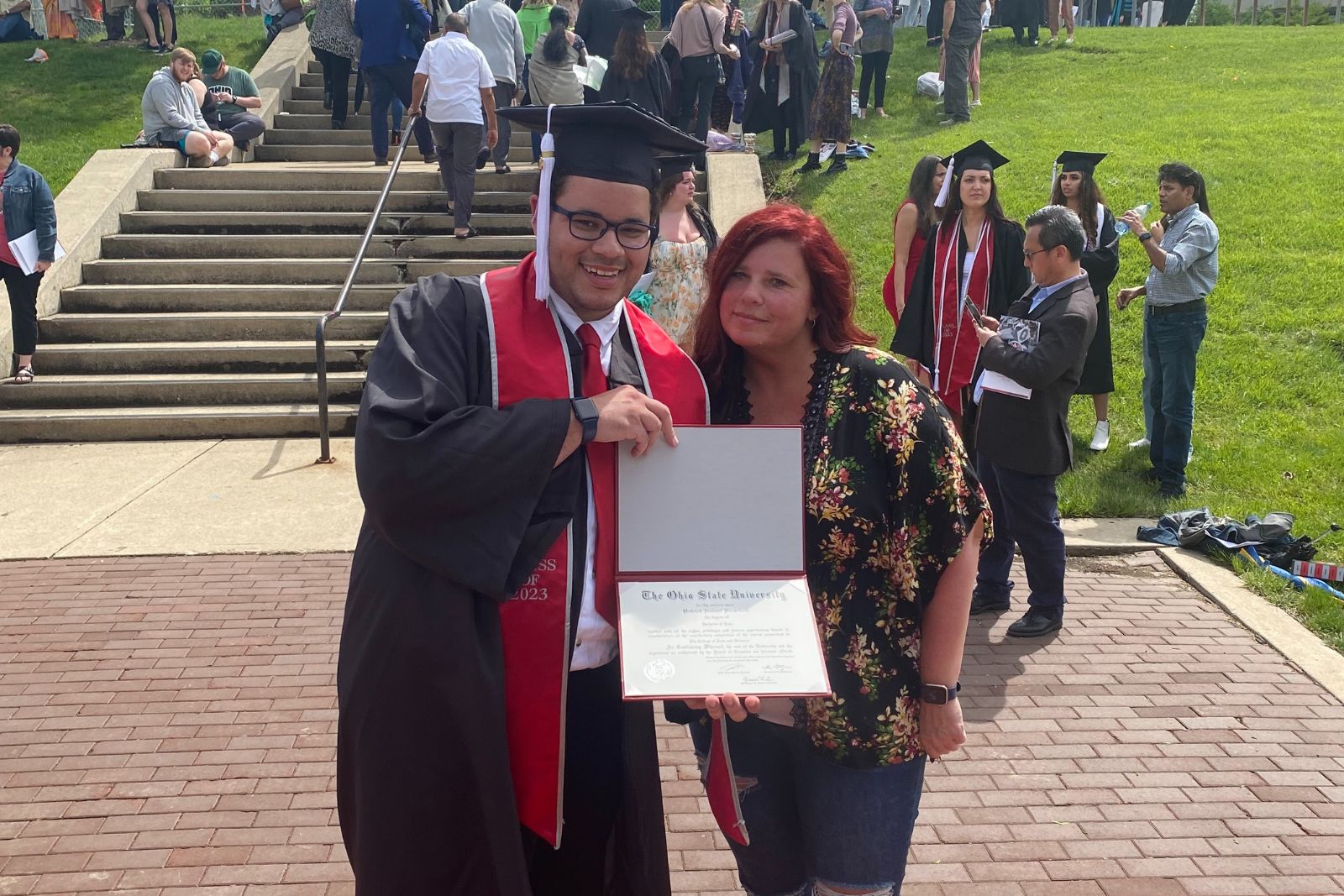College Declassified: Tips and Hints for First Gen College Students

Patrick Bradford is a recent graduate of The Ohio State University. He was the first in his family to attend a four-year college directly after high school. He shares what he learned from his experience to help other first-gen students preparing to enter or already in the college experience.
Preparing for college is a daunting task in its own right. From touring universities to choosing a major and everything in between, the process of preparing for the next steps of your education can bog down even the most prepared of high school graduates. This challenge can be even harder for first-generation college students, like me.
On the heels of my own time pursuing my undergraduate degree, I’ve had some time to reflect on my experience as a first gen student and compiled some valuable information for those undergraduate students who may feel overwhelmed and in the dark about what comes next.
Know Before You Go
No matter when you’re starting your college search, the first step should always be to do your own research. Emphasis on YOUR OWN. I began my college research halfway through my junior year of high school. For me, that process was taking very detailed – albeit chaotic – notes on a Word doc about each college I wanted to apply to and their programs and culture.
In today’s world, when there are so many external influences on our decisions, it is integral to not let the allure of a well-crafted admissions brochure or a school’s presence in mainstream media be the only reason you add a certain college to your application list. These are great ways to spark your interest, but they don’t always provide a broader picture of the student experience or what you might be looking for from your future college.
Think of it this way: most people who’ve ever written an essay for a high school English class know that the first step to writing that paper is to do your own research and find evidence that supports your ultimate stance. The same can be said of picking your application wish list.
Take the time to explore a university’s website, see if you can connect with alumni, or even take a look at the reviews on websites like StudentReviews or U.S. News & World Report to gain a better picture of what colleges might be best for you. This will not only save you time on your application process, but money as well by avoiding unnecessary application fees.
Admissions Offices Are Your Friend
Being a first gen college student is a great accomplishment, but one that tends to leave students feeling left out or behind the curve when it comes to the application/enrollment process. Luckily there is a great resource that you will have at your disposal the minute you start your application: the admissions office.
University admissions offices are treasure troves of knowledge for college admissions. While each school may have their own system of admissions, there are many universal policies and practices that admissions staff have become experts on. This makes them a great resource for you throughout your admissions process.
Cut Your Parents Some Slack
Current and soon-to-be college students, this one’s for you. Being a first generation student means your parents are also new to this process as well. It might seem like a walk in the park for them since they aren’t the ones actually going to classes or living in a dorm, but there are plenty of obstacles they can face, as well.
My mother was just as in awe of how intricate – and at times complicated – the college admissions process was. Still, she made sure to support me throughout the process and even throughout my time as a student.
Knowing deadlines, filling out paperwork like the FAFSA, and trying to contend with their pride and joy growing up is hard work and can easily make them feel overwhelmed with their role in this new chapter in your life. So, be patient with them. Let them ask their questions and fold your laundry whenever they offer. And remember, that just might be you someday.
It will be awkward…at first

So, you’ve picked your college, enrolled and moved into your dorm. Congrats, you’ve conquered the lead up to your college experience! But wait, now you’re a fish out of water with a campus full of complete strangers, what do you do?
Step one: don’t panic.
The first few weeks of your first semester will no doubt feel odd and somewhat like a haze of meeting new people, exploring a new setting and just generally avoiding possible social anxiety. The bright side? You’re literally not alone in this feeling.
Some of my best friendships from my time at Ohio State started with simply addressing the elephant in the room: we’re all new here and this is kind of weird, but let’s make the most of it. All it really takes is that little spark to get the ball rolling on finding comfort in your new setting.
It can be easy to give in to human nature and feel like you’re the only one feeling out of place at your new college, but I’m here to tell you that the truth couldn’t be more opposite. The beauty of being a freshman is that you have an entire class of people experiencing the same new feeling as you. This is a great thing to remember when you find yourself struck with some anxiety about your new chapter.
How To Navigate Your First Few Weeks
Welcome to the first week of classes, where you will encounter professors of all kinds. Some will spend the lecture going through the course expectations and syllabus. Others may put your academic skills to the test off the bat and have actual coursework to complete on the first day.
The unfortunate reality is that syllabus week is always a mixed bag. In a large academic setting like college, you can’t expect every class or professor to operate the same. So, what do you do?
First, always read the syllabus! This is your essential guide to the semester ahead in your course and will likely be a valuable resource throughout the class. As someone who ignored my fair share of syllabi and later regretted that choice, take my word for it.
Second, get some rest. The first few weeks at college can be extremely draining. You’re being bombarded with information, learning new names and faces, and trying to find your way around campus. You will get tired out.
Lastly, make some time for fun. The first few weeks of the semester can have the best vibes! There are often a lot of cool (and free) events happening on campus, as well as the last few remnants of summer in the air. Take advantage of this excitement and blow off some steam before getting into the thick of things.
Being on Your Own’ Isn’t as Scary as it Seems

One of the biggest hurdles of starting college is the fear and anxiety that can come with being on your own. It is no easy feat to adjust to a new environment while you take charge of your life and begin to grow into your own. But just because something sounds scary doesn’t mean it is.
With the plethora of resources and support provided by universities, in addition to the social support of your friends and family members, you’re already on the path to success before you’re even moved in.
In fact, being on your own can be somewhat empowering. This time in your life is when you will grow the most. Personally, professionally, and everywhere in between, the person you become on this journey is the person you were ultimately meant to be. So, don’t let the fear keep you from working toward your goals and pushing your own boundaries when you feel comfortable.
A Loose Plan is Still a Plan
Fun fact: just about a third of all college freshmen change their majors before graduation according to the U.S. Department of Education.
Another fun fact: most large colleges often offer over 100 majors and specializations. But what do these education statistics have to do with one another? Simple, they present an interesting challenge for college freshmen to navigate as they begin their college careers.
I changed my major three times before landing on a Political Science-Strategic Communication double major that satisfied my career goals and personal interests. With this unique obstacle in mind the best thing you can do as first-generation students is to create a loose plan for your time at school.
Emphasis on loose.
Always get your General Education requirements out of the way as soon as you can to avoid having to play catch up during your senior year (something I learned the hard way with BIO 1101). Additionally, if you’re stuck between a couple majors, map out the course load for each so you can have a solid understanding of what each will require for graduation.
Most importantly, set personal goals for yourself as you go. Whether you set them by the semester or by the academic year, take the time early on to lay out these goals and keep track of them as you go.
All in all, there’s a lot to know when entering college as a first generation student, and not all of it will fit in just one blog post. But, I hope with these few tips and tricks, you (or your first gen student) will feel just a bit more prepared for the adventure that is college.

Patrick Bradford
Patrick Bradford is a 2023 graduate of The Ohio State University. He was the first in his family to attend a four-year college directly after high school.
